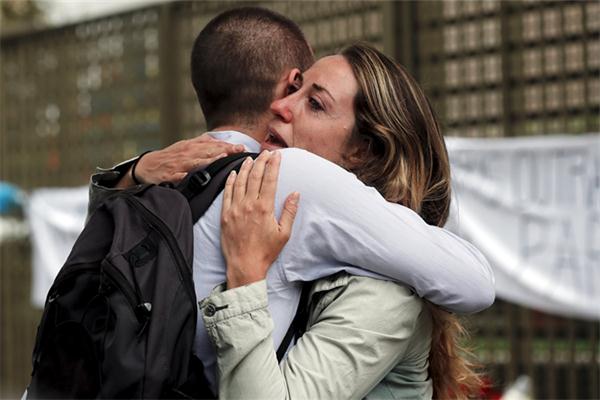Moral confusion cause of new wave of terrorism
By Greg Austin (chinadaily.com.cn) Updated: 2015-11-16 17:29
 |
|
French citizens cry next to tributes offered for victims of the attacks in Paris, outside the French embassy in Bogota, Colombia, November 15, 2015. [Photo/Agencies] |
Brace yourselves. There is a new wave of terrorism, as the Friday night tragedy in Paris, coming to some G20 countries. It will have many roots, but a principal one, regardless of the ideological cause, will be the cynicism of the great powers toward the civil war in Syria.
A secondary source will be the impunity with which the Islamic State is now operating.
And a third source will be the moral confusion in the West about the role of the state in upholding a defensible view of what constitutes right and wrong.
In summary, extremists of all persuasions with a bent to violence will come at us in a new wave because some governments collectively have lost their moral compass and their enemies sense it.
Terrorists are for the most part not morally sophisticated, but they all see themselves as driven by a simplified concept of morality. The wave of terrorism we saw in the United States and Europe in the 1960s and 1970s was indeed a wave. While each group had its separate national or internationalist inspiration and motivation, they were all emboldened by each other's successes. Their appeal was bolstered by a shared belief that the international system was not only highly corrupt and immoral but highly vulnerable and possibly impotent.
One symbol among many of the unifying moral outrage of diverse terrorist groups decades ago was the US bombing of North Vietnam (Operation Rolling Thunder that lasted for three years from 1965 to 1968) and then in 1970 the bombing of Cambodia. The use of defoliants like Agent Orange in Vietnam also contributed to the image among extremists that people were indeed living in Apocalypse Now.
Recently, UN Secretary General Ban Ki-moon (and Red Cross President Peter Maurer) said: "In the face of blatant inhumanity, the world has responded with disturbing paralysis." Their statement has a range of meanings and demands response at many levels. But on one level, it should be taken as a warning sign. People have again entered the moral landscape of the mid-1960s in terms of the perceived moral paralysis of most governments in power.
This situation will foster a new wave of terrorism akin to what people saw four to five decades ago.
Of course, we need to bear in mind that terrorism has not been quiescent between 1975 and 2015. In fact, we have been mobilized around a war on terror since Sept 11, 2001. Yet the empirical evidence is that the terrorists are winning. Many enjoy impunity for their actions, especially Boko Haram. And the West has too often resorted to bombing as a solution, or supported rotten regimes.
After all the ordnance that has been dropped by the US, its allies and by Russia after Afghanistan (1979-1988) and Grozny in Chechnya, Russia, (1999) — the hapless Muslim countries — and the persistent violence in Palestine on a lower scale, the terrorists are still winning more than ever before. They are certainly more emboldened.
What is feared is that extremists of all persuasions will begin to believe they have a new license to kill. Arguably, the new wave has already started with widespread "lone wolf" violence in the US and Europe by young people who we don't recognize as terrorists because they are not part of a network or movement.
Explanations of mass shootings in the US vary between blaming it on gun laws or on mental illness. But the reality may be different. Perhaps it is a new form of decentralized terrorism. To complete the global picture, the last few years have also seen a surge of terrorist actions in China.
As the new wave terrorism builds, acts of generosity and humanitarianism by many people and their governments will not matter as long as the moral paralysis described by Ban and Maurer remains in place.
Morality is in the eye of the beholder. There will always be potential terrorists no matter what leading governments of the world do. But our moral confusion, ethical paralysis and seemingly perpetual resort to bombing are all a source of increased danger to us.
The author is a professorial fellow at the EastWest Institute.
The Globalist

I’ve lived in China for quite a considerable time including my graduate school years, travelled and worked in a few cities and still choose my destination taking into consideration the density of smog or PM2.5 particulate matter in the region.











